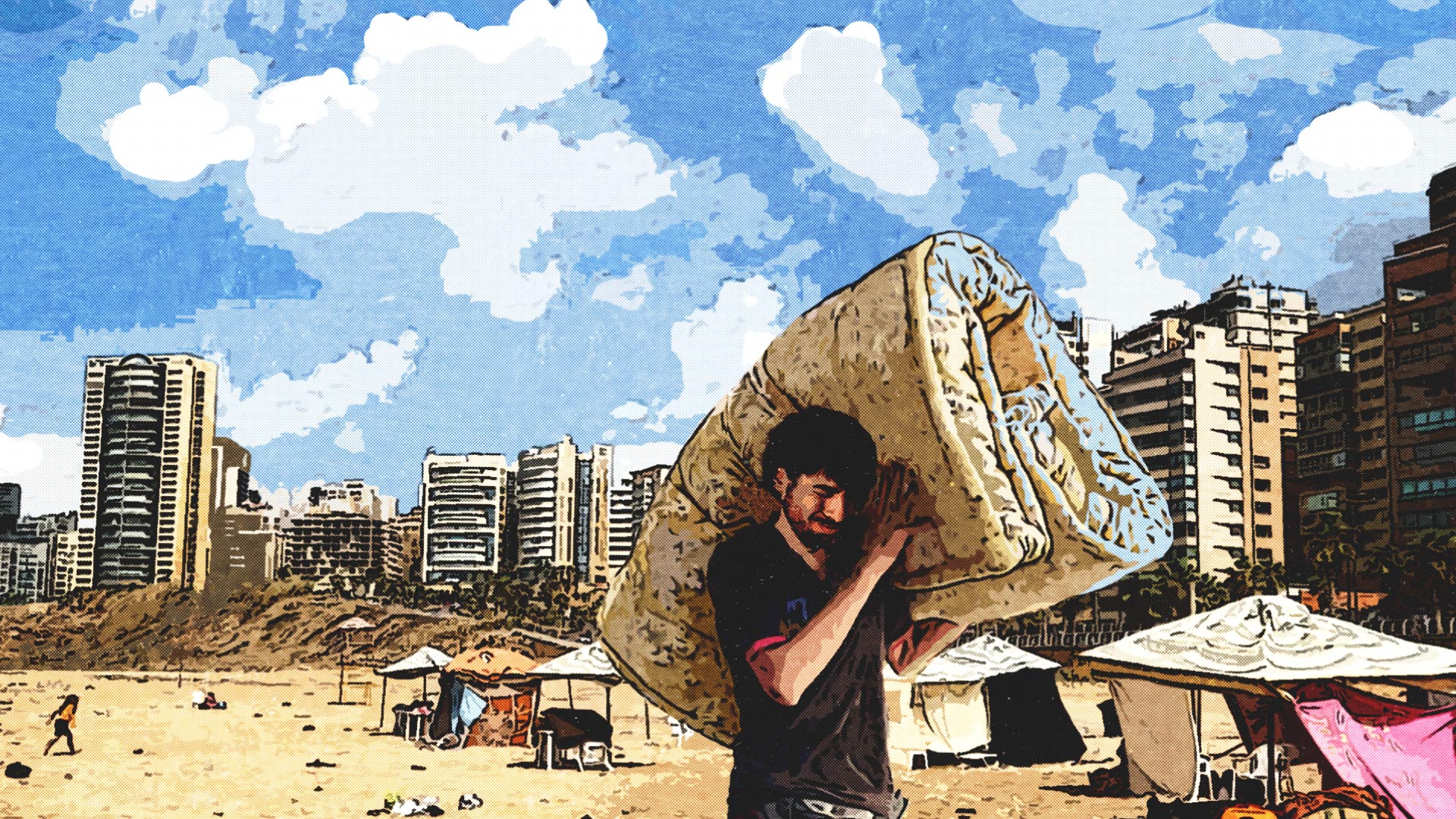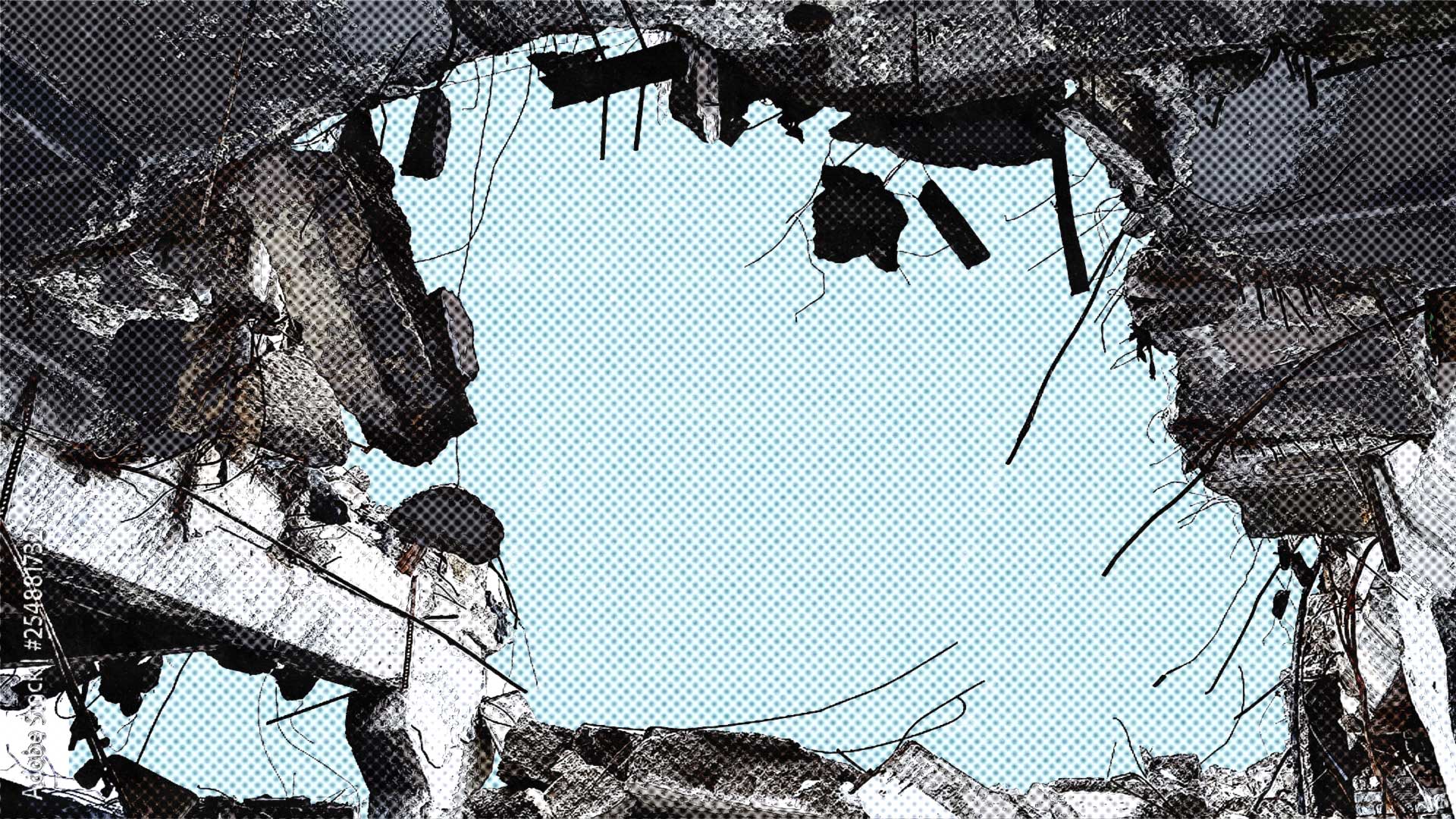As Israeli bombardments intensify across Lebanon, the shadow of the country’s past conflicts has resurfaced in a new, deeply human crisis: the scramble for shelter. With an estimated 1.2 million people displaced in two weeks,1 areas in Beirut, Mount Lebanon, and North Lebanon deemed ‘safer’ than others, have become flashpoints for tensions over finding shelter.
Skyrocketing demand has driven up rents, leaving the most vulnerable at the mercy of some exploitative landlords. Yet, amid the greed, solidarity has also emerged – residents are opening their doors to those in need, exemplifying both the best and worst of human nature during crises.
The Lebanese government’s minimal and insufficient intervention, paired with vacant properties and unregulated rent, has left thousands of internally displaced persons (IDPs) unable to find or afford accommodation.
And while landlords and real estate brokers are being condemned for rent gouging,2 a more nuanced situation, revealing a dangerous mix of fear, desperation, and state negligence, seems to be at play.
Unaffordable Rent Prices Alongside Vacant Houses
In the chaos of sudden displacement, the first victims are the vulnerable: families fleeing the heavy Israeli bombardment in the South, the Bekaa, and the southern suburbs of Beirut with no clear direction of where to go, competing for a rapidly shrinking supply of both affordable housing and spaces in government-organised collective shelters.
In an interview with Badil, Tala Alaeddine, Research Coordinator at Public Works Studio, revealed how the Studio investigated a sample of rental prices across ‘safe’ areas following the escalation since the 23rd of September. The ongoing study revealed that the average rental price in Beirut is currently $728/month, compared to $733/month in Mount Lebanon, and $429/month in Akkar.
“If you compare these prices to the average minimum wage in Lebanon – $200/month, and the fact that Beirut is being bombed – these rental prices are very high. Most displaced people cannot pay this rent, and there is a very low supply of rental offers compared to the high demand for accommodation,” Alaeddine explained.
The inability of IDPs to afford the high rental prices is compounded by how many have tragically lost their livelihoods due to the war and are still bearing the brunt of Lebanon’s ongoing financial and economic crisis.
As well as soaring demand, the rent increases are indeed the product of some real estate owners, brokers, and private landlords’ intent to drive prices through the roof. In fact, since the enactment of the Rental Law of 1992, landlords are immune from rent control measures.3 “While we estimate that rent prices have increased by about 10-20% across the country, there are cases where they have increased by 100% or more,” according to Johnny Assaf, Founder and Managing Partner at Beirut Living Real Estate. The unaffordable housing crisis is unsustainable, Assaf explained, “because the most common housing demand from IDPs is on a short-rental basis of 1 – 3 months. If the conflict goes on for much longer, many of the IDPs currently renting private housing will no longer be able to afford the rent prices.” This could create another wave of homeless IDPs, risking an increase in inter-communal tensions and vulnerability.
Unaffordable housing is exacerbated by the high rate of vacant accommodation in Beirut. “Of all the empty flats in Beirut, which represent around 30% of the total number of flats, I would say that around 35% are filled in Achrafieh [in East Beirut] and 60% are filled in Hamra [in West Beirut],” Assaf explained. Alaeddine also told Badil how many of the vacant housing are used by wealthy investors, state-owned, or under jurisdiction of religious endowments, at the expense of the Lebanese people.
The Fear Factor & Tensions
While there is some truth behind greedy rent gouging, there is also an undercurrent of fear and distrust which is shaping Lebanon’s housing crisis; being expressed through sectarian, racial and class-based tensions.
The influx of IDPs from the Bekaa, the South, and Beirut’s southern suburbs — areas strongly associated with Hezbollah — has raised fears among host communities that accepting these tenants might put their properties at risk of becoming targets.
Such fears are not baseless, though. Rentals have been directly targeted by Israel after displaced families have moved into them. On September 30, 2024, the Israeli army targeted a house in Ibl Al-Saqi hosting an IDP family from the South, killing several members of the family in addition to wounding a Greek Orthodox priest.4 At the same time, such fears have been exacerbated by Lebanese media — and relayed by some political parties — which published unverified claims that Hezbollah members hid among the population in collective shelters.5
“While in Beirut the solidarity in the community is notable, reflected in a general open-house or open neighbourhood policy for IDPs, it is true that some neighbourhoods have been more welcoming than others,” noted Assaf to Badil. “In Hamra, I’d say 60% of host communities are open to renting to or accepting IDPs in the area, but in Achrafieh, a Christian majority area, it’s more like 30-40%.”
Indeed, as a result, security concerns over the influx of IDPs have reignited sectarian tensions. Certain municipalities in traditionally Christian and Druze areas, such as Falougha located east of Beirut, have pressured residents not to accept IDPs.6 Similar cases happened in traditionally Christian areas such as Ain Al-Remmaneh and En Nabi Youchaa, where residents refused to host displaced people outright.7
The housing crisis is also affecting Syrian refugees. Alaeddine noted a case where a Syrian family was evicted by their landlord, who preferred to rent to Lebanese displaced by the war. Although not widely reported, Alaeddine fears this isn’t an isolated incident. There are also reports of Syrians being denied entry into collective shelters.8
Lastly, tensions have been emerging around social class, as well as being sect-based, as Soha Mneimneh, an Urban Planner and Researcher, explained to Badil: “Those IDPs who have no financial means and are in collective shelters, concentrated in Christian neighbourhoods, or squatting buildings are considered a threat by different communities as some see it as an undesirable change in neighbourhood demographics – during the Lebanese Civil War, we saw people of lower socio-economic classes squatting some buildings in Beirut neighbourhoods – a similar pattern as now, so it is bringing back memories of Lebanon’s past wars.”
Beyond Price and Distrust: The Government’s Unpreparedness
Ultimately, the housing crisis is symptomatic of a deeper problem: the Lebanese state’s chronic unpreparedness.
The Lebanese government’s emergency response plan, while recognising the need for increased shelter capacity, failed to implement effective measures to address the true scale of the crisis. With a narrow focus on the South, it underestimated the conflict’s potential spread, leading to inadequate preparations in regions like Beirut and Mount Lebanon, which are now heavily impacted. Additionally, relying on outdated displacement patterns from the Israel-Lebanon 2006 war meant that the government did not anticipate the current movement of IDPs, resulting in an overestimation of the needs for shelter in the South governorates and severe overcrowding in the North and Akkar. The caretaker minister of environment and head of the government’s emergency committee, Nasser Yassin, did not respond to a request for comment.
“The government’s emergency shelter plan fails to include any measure or forward-thinking plan to respond to the increase in rental prices such as a rent cap. The Parliament could introduce a decree, as it did during COVID-19, to extend the deadlines of all legal contracts,” Alaeddine explained to Badil. If a State of Emergency is declared, all legal contracts will automatically be frozen.
The central government’s inaction forced the Nabatieh local authority to step in. On 20 October 2023, the governor of Nabatieh issued a circular to curb the exploitation of displaced persons by establishing rent controls, aiming to protect vulnerable populations moving from border regions from being exploited by landlords.9 However, this is the only known example of a local authority implementing such a step since the war began in October 2023.
According to Alaeddine, “Although it remains unclear whether these regulations were effectively implemented on the ground in Nabatieh, such policies should be implemented across all governorates of Lebanon, and especially those which are the primary destinations for the influx of displaced persons.”
While the Lebanese government’s response could have been more effective, Lebanon would undoubtedly not be in this situation if it were not for Israel’s war of aggression. What remains to be seen is whether social cohesion can be preserved amidst the scramble for shelter and the continued bombardment of civilian areas by Israel.
1UNHCR. “Displaced families in Lebanon year for peace and a return home.” UNHCR, 6 October 2024. https://www.unhcr.org/news/stories/displaced-families-lebanon-yearn-peace-and-return-home
2Clara Nabaa. “Lebanese people fleeing Israeli bombardment face rent-gouging and overcrowding.” Euronews, September 27, 2024. https://www.euronews.com/2024/09/27/lebanese-people-fleeing-israeli-bombardment-face-rent-gouging-and-overcrowding
3Lebanon’s Rent Act: A New Drain on the Public Purse. Monthly Magazine, May 9, 2014. https://monthlymagazine.com/en/article/962/lebanon’s-rent-act–a-new-drain-on-the-public-purse
4Lebanon Archives. Twitter, October 1, 2024. https://x.com/booklebanon/status/1840878283648356579
5On October 9, 2024, Lebanese TV station MTV Lebanon reported that Hezbollah members hid among the population in the streets and collective shelters. The news was relayed by the Kataeb Party but has since been deleted from both MTV Lebanon and the Kataeb’s websites.
6Al-Arabiya. “جدل في لبنان.. بلدات ترفض تأجير نازحين من مناطق حزب الله.” Al-Arabiya. August 11, 2024. https://www.alarabiya.net/arab-and-world/2024/08/11/جدل-في-لبنان-بلدات-ترفض-تأجير-نازحين-من-مناطق-حزب-الله
7Suzanne Baaklini. “À Aïn el-Remmané, un raté de la « solidarité nationale ».” L’Orient-Le Jour, September 24, 2024. www.lorientlejour.com/article/1428354/a-ain-el-remmane-un-rate-de-la-solidarite-nationale-.html ; Tripoli News Network. “في المنية اشكال واطلاق نار دون تسجيل اصابات ما علاقة النازحين.” Facebook, September 29, 2024. https://www.facebook.com/tripoli.TNN/posts/989838143172080
8https://www.infomigrants.net/en/post/60294/attacks-on-civilians-pile-fresh-misery-on-lebanon–unhcr
9Nabatieh governor. “تعميم للقائمقامين والبلديات ومخاتير القرى التي لا يوجد فيها بلديات ضمن محافظة النبطية.” October 20, 2023. https://cdn-5e344ff7f911c80ca0df760f.closte.com/wp-content/uploads/sites/102/2023/12/التعميم.jpg



